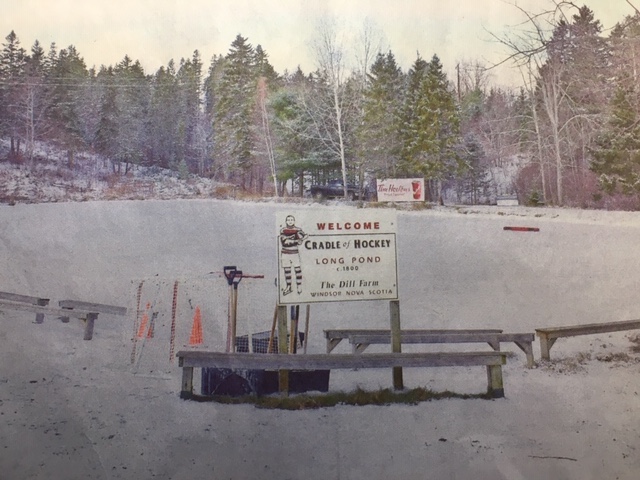
The big day is less than three weeks away. We’ve had plenty of snow (if a bit tamped down by this week’s rain) to keep things reasonably white until Dec. 25. All over town, homes have sparkled with flashing or cascading lights (and some with gaudy decorations) since we switched back to Eastern Standard Time in early November. And yet I’m still having trouble coming up with the right gift for some of my friends and family.
Me? I’ve found what I want for Christmas. I learned about it in the Globe and Mail a couple of weeks ago.
“A pond at the heart of hockey,” the story was headlined. “Nova Scotia property claims a historic tie to Canada’s game.”
And it’s for sale!
Nestled on the back-40 of a farmyard – about 23.78 acres according to the Globe story – way off the main thoroughfares of Windsor, Nova Scotia, lies a small private pond. It’s about the size of, well, a small-town hockey arena.
And in no other way has this pond any significance, except that one winter, about 215 years ago, a bunch of young men attending the nearby King’s College made a bit of history there. Here’s the way local judge, author and provincial legislative member, Thomas Chandler Haliburton, noted it in his diary.
“And boys let out racin’, yelpin’, hollerin’ and whoopin’ like mad with pleasure,” Haliburton wrote. “(playing) a game of hurley on the long pond on the ice.”
All that racin’ and whoopin,’ it turns out, was on skates as the boys chased a wooden puck with hurley (field hockey) sticks. In case you haven’t figured it out, this was apparently the world’s first recorded game of recreational hockey. And the descendant of that game on Long Pond in 1803, is what 99 per cent of us play on frozen sloughs, shinny ponds and backyard hockey rinks just for the joy of skating, passing and shooting a puck.
By the way, it’s not I who’s determined that Long Pond was the birthplace of hockey. It’s local Nova Scotian historian Garth Vaughan.
“This is the earliest reference to hurley being played on ice in Canada,” Vaughan wrote in his book The Puck Starts Here, in 1996. And he continued, “When the game became more popular and the boys were wanting to play it on Sundays, a lot of parents and most of the clergy got upset because it interfered with Sunday school and church attendance. Many thought the game was dangerous and should be forbidden.”
About the time Vaughan began writing about these hockey origins, so did I. He invited me down to Windsor to see the pond, the artifacts he’d gathered and the Windsor Hockey Heritage Centre (for all intents and purposes his basement). Before long, the NHL and even the Canadian Hockey Hall of Fame took notice of Vaughan’s evidence and changed references from Montreal and Kingston as the birthplaces of hockey to Windsor, N.S.
“I know of no place in Canada where there is any written evidence of the game being played any earlier,” wrote Brian McFarlane, host of TV’s Hockey Night in Canada for 27 years, and the author of a dozen hockey histories. “So, I support Windsor’s claim.”
But the roots of Canadian history actually go deeper into the soil around Long Pond than is immediately obvious. If one looks a bit closer, and the Globe and Mail story reveals this too, the pond and the 12 acres are currently owned by the legendary Dill family.
From as early as 1878, when the Dills purchased the land, they began cultivating giant pumpkins. In fact, when I visited the farm in the fall and Howard Dill’s famous, patented Atlantic Giant pumpkin seeds had successfully yielded their bounty in the form of refrigerator-sized pumpkins. Even as I sat interviewing Howard, tourists drove in from the U.S. looking to purchase seeds and to pose with Howard next to his enormous pumpkins.
For all those giant pumpkins in Howard Dill’s farmyard and for the famous Long Pond beyond, the family has sought for many years to turn the private property into a public resource and leverage its claim to being “the birthplace of hockey.”
“They keep bringing up the Cooperstown (Baseball Hall of Fame) model,” real estate agent Dave Kerr explained to the Globe and Mail. “They think if this were in the States, there’d already be a resort here.”
Oh, and that brings me to perhaps the most interesting, if disappointing, aspects of my story (and my secret dream of receiving this little plot of land as a gift). The asking price for Long Pond and the farmyard that yields those Giant Atlantic pumpkins is $1,380,000. That’s about $40,000 per acre and about $39,000 per acre beyond my budget.
Ah, but isn’t that what Christmas-gift giving and rec hockey are all about? Dreaming.